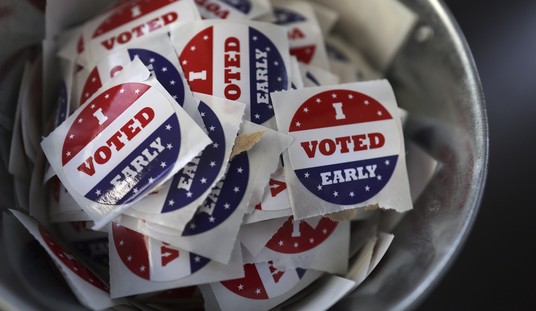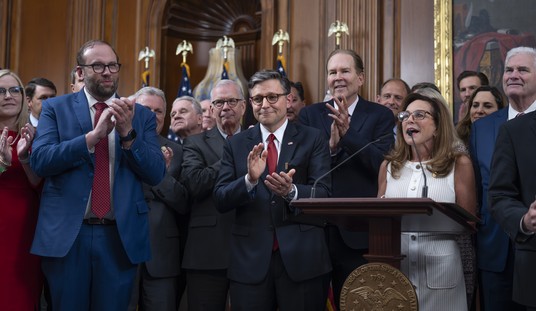
In 2007, Florida’s newly-elected “Republican” Governor Charlie Crist announced, with much fanfare, a costly “cap and trade” plan to regulate carbon emissions by Florida electric power plants. In the Spring 2008 legislative session, Crist pushed the Florida legislature to adopt his mandates into law. During the months-long public debate on the plan, Florida House Speaker Marco Rubio called for free-market approaches to “clean energy” and decried European-style mandates. Instead of Crist’s plan, the legislature at Rubio’s insistence passed a bill (which Crist reluctantly signed) that instructed the state Department of Environmental Protection to develop a potential plan, which would then go back to the Legislature no sooner than 2010 to put it up for a vote before Crist (who was then projected to be up for re-election in 2010) could actually do anything. The delaying tactic worked: the mandates were never passed into law, Crist ultimately ran away from them while running for Senate in 2009, in large part due to Rubio’s (successful) primary campaign, and by 2013 the whole scheme had been repealed. None of these facts are reasonably in dispute – yet Crist in 2009 ran with a wholly disingenuous attack claiming that Rubio had supported cap-and-trade, and some of Rubio’s critics in this race are recycling that attack. Charlie Crist’s sloppy seconds should be no less nasty this time.
Let’s go blow-by-blow here to get the context.
Orange Charlie’s Big Green Plan
In 2007-08, after winning election amidst the Democratic wave of 2006 and as an even bigger wave (in which Barack Obama would carry Florida in November 2008) was cresting, Crist was a popular new governor trying to pull Florida to the left on carbon emissions, and getting lots of fanfare for it:
In his first address to the Legislature in March 2007, Crist said global warming is “one of the most important issues that we will face this century.” He promised to “bring together the brightest minds” and “place our state at the forefront of a growing worldwide movement to reduce greenhouse gases.” Crist convened a two-day climate-change summit in Miami that attracted 600 participants, then announced far-reaching changes in the state’s energy policies: cutting power plant emissions, requiring the use of alternate fuels and rewriting the building code to require more energy efficiency…
Crist’s climate-change crusade got him national attention, with a write-up in Time magazine and an interview on the CBS Early Show. He shared a stage with singer Sheryl Crow and met with Robert Redford. California Gov. Arnold Schwarzenegger called him “another great action hero.”
He held a second summit in 2008 and even flew to London to participate in climate-change talks with British leaders. Meanwhile, he halted a move by the Florida Fish and Wildlife Conservation Commission to remove the manatee from the state’s endangered list. And at his urging the Public Service Commission rejected a plan by the state’s largest utility to build a $5.7 billion coal-fired power plant near Everglades National Park.
Rubio Fires Back
In July 2007, Rubio took to the pages of the Miami Herald to push back, with his characteristic more-in-sorrow-than-anger tone, aimed at persuading voters who liked the sound of Crist’s ideas that the carbon emission mandate plan was a bad idea:
Recently, Governor Crist issued a number of bold and well intentioned energy edicts. We should applaud Governor Crist’s willingness to spend political capital tackling such an important issue. However the government mandates he has proposed will not only fail to achieve their desired result, they carry actual negative consequences.
One impact is an increase in the cost of utilities.
The Wall Street Journal reported that Massachusetts Institute of Technology researchers recently examined what would happen if Congress mandated the kind of emissions caps that Gov. Crist is advocating for Florida. The team at MIT’s Joint Program on the Science and Policy of Global Change found that such caps would cause consumer utility bills to shoot up by some 25 percent to 50 percent in coal-burning regions, like Florida.
Other estimates indicate that Kyoto-like carbon caps could result in electricity bills that rise from the current 8-cent per kilowatt average now seen in the United States to the 25-cent kilowatt average which burdens families in Europe. The United Kingdom alone saw a 14-percent increase between 2005 and 2006. Floridians already are paying too much in taxes and insurance. The last thing we need is higher utility bills.
…Instead of adopting measures that will have little if any impact on our environment and make life in Florida more expensive, we need a strategy that encourages environmental conservation, fuel efficiency and energy diversity, while continuing to stimulate our economy.
Rubio’s alternative plan wasn’t all pure free-market: he was also pushing “green energy” tax incentives, including for ethanol (the final bill included an ethanol mandate of the type that Rubio and a number of his primary opponents now want phased out at the federal level). But he was vocally against carbon-emission mandates from the very outset on grounds that they would be costly out of proportion to any possible effect.
Crist Riding High
The Tampa Bay Times, writing in 2009, noted that Crist seemed to have the upper hand as the 2008 legislative session started:
By 2008, as Crist’s poll ratings held strong, Rubio called a federal cap-and-trade system “inevitable” and said Florida should be at the forefront. He hired a leading climate change expert from the Massachusetts Institute of Technology to advise lawmakers and appointed Miami-Dade Clerk of Courts Harvey Ruvin — who sounded the alarm on climate change years ago — to a statewide energy board.
We’ll come back to that quote in a minute, but it was not isolated – Rubio at the time was convinced that the federal government was going to force down cap-and-trade on the states, and argued that there was money to be made in Florida meeting the demand for new technologies to comply with Washington’s mandates:
This nation and ultimately the world is headed for an emissions tax and energy diversification. Those changes will require technological advances that make those measures cost effective. The demand for such advances will create an industry to meet it. Florida should become the Silicon Valley of that industry.
As it would turn out, the political momentum of cap-and-trade would be slowed down by the 2008 financial crisis and other events. But at the time, a rearguard action would be needed to buy time – a traditional method of blocking runaway political initiatives.
In January 2008, however, Crist was attracting national attention, and told a left-wing rag that he had been converted to the “climate change” cause by an adviser to California Governor Arnold Schwarzenegger, who he saw as a “role model” on the issue (Ah-nold remains a cautionary tale on the hazards of recruiting celebrity amateurs with vague principles to run for office as “Republicans”).
The Rubio Interview, March 2008
Rubio critics today are circulating this clipped video from eight years ago, which was anonymously added to YouTube last week, and which basically recycles a 2009-era Charlie Crist attack ad that claimed that Rubio was the one who supported cap-and-trade:
You can tell from the clip that Rubio is cut off in mid-sentence. Here’s the short video summary of what was left out:
Florida conservatives didn’t fall for that then, nor should conservatives further removed from that battle fall for it now. The clip is from a half-hour interview Rubio did on March 13, 2008 – you can watch the crucial four-minute segment from 22:50 to 25:15 here. Rubio started off by noting that the budget crisis in Florida (related to the economic downturn) would prevent funding any “clean technology” initiatives, and then moved on to the cap and trade bill. Here’s the crucial passage:
There’s nothing Florida can do by itself to change climate change in the world. We are less than 2% of the greenhouse gas emissions on the planet, and even if tomorrow every car and every airplane in Florida were to stop…carbon emissions in the world would not noticeably decline, because the…environment has no boundaries. So then what should Florida do?
Florida should do two things. First, Florida should position itself for what I believe is inevitable, and that is a federal cap and trade program. Florida should do everything it can to be be an early complier so it that can access early compliance funds and so that it can help influence what that cap and trade looks like at the federal level. And so I’m in favor of giving the Department of Environmental Protection a mandate that they go out and design a cap and trade or a carbon tax program and bring it back to Legislature for ratification sometime in the next two years.
I’m in favor of them designing it. I’m not in favor of them designing it and implementing it. I’m in favor of them designing it and then bringing it back to the Legislature.
The second thing we need to do in Florida is, we need to look for ways for us to become a leader in the industry of clean technology. The future of energy – the way we’re gonna clean up our environment, the way we’re going to lower carbon emissions is not through government mandates. It’s through the American innovator. Americans have always proven that if you can make money doing something, we do it a lot and we do it well. And I believe the same will be true for energy. We will find clean, reliable, independent sources of energy in America. The innovators in America’s economy will find that for us if we give them the incentive to do it and the time to do it. And that’s what anything we do should be based upon – not big-government mandates like they do in Europe and California.
In the context of the legislative battle at the time, it’s crystal-clear that Rubio was not backing Crist’s plan for California-style mandates – he explicitly said that was the wrong way to go. Instead, he proposed letting the bureaucracy spin its wheels for a while coming up with a more specific proposal (inside the Beltway, this sort of thing is usually done by handing things off to a “bipartisan commission” or “blue-ribbon panel” – Rubio clearly knew that game eight years ago), thus preventing any mandate plan from passing into Florida law without a chance for the Legislature to live to fight it another day.
Crist Caves
The environmental bill, House Bill 7135, was ultimately signed into law by Crist on June 25, 2008. Crist by this point was auditioning to be John McCain’s vice presidential nominee, and TIME Magazine noted that week that while “America’s tree-huggers virtually canonized Crist,” he was also making concessions on offshore oil drilling, and “on Wednesday Crist signed a bill (albeit weakened by the G.O.P.-led state legislature) to finally phase in auto and carbon emissions limits in Florida — including the first ‘cap and trade’ arrangement in the Southeast, whereby companies that exceed their air pollution caps can buy emissions credits from firms that keep pollutants below their caps.”
According to the State House legislative analysis at the time, the final bill’s effect included “[a]uthorizing the DEP to adopt rules for a Cap-and-Trade Regulatory Program to address GHG emissions from electric utilities, subject to legislative ratification and not prior to the 2010 Legislative Session.” In the absence of legislation, Crist was powerless to act, as his own DEP head admitted: “[a]n executive order would not have been able to implement a cap-and-trade system on its own. We needed the legislative authority.”
Rubio in 2009 argued that he had killed Crist’s plan by shunting it off to DEP for further study:
Rubio said…that his position on cap and trade — which allows companies that don’t reach emission caps to trade pollution credits — hasn’t changed. The Florida law’s requirement that the plan return to the GOP-led Legislature for final approval appeased the business lobby and, Rubio said, was guaranteed to stop it in its tracks.
“It has worked out as it was designed to work out, which was to stop a cap-and-trade system in Florida,” Rubio said Thursday.
The Club for Growth “cited Crist’s support for cap-and-trade legislation when it…endorsed Rubio” in that race. Today, the Club’s generally favorable “white paper” on Rubio’s record on free-market and economic growth issues notes that Rubio “voted for legislation…that authorized – with legislative approval required for implementation – Florida’s Department of Environmental Protection to pursue a system of cap-and-trade to reduce greenhouse gas emissions.”
Talking to people involved in the process in November, the National Journal concluded that Rubio was right:
In his second session, Rubio played hardball with Crist. Climate change was one of Crist’s signature issues, and he wanted the Legislature to pass a bill that would lay the groundwork for a California-style cap-and-trade system to cut carbon emissions. Rubio and House conservatives opposed the idea, but public sentiment was with Crist. The House ultimately passed the bill, but Rubio’s team inserted a poison pill that prevented the plan from going into effect. “I fully credit him with the gutting of the bill,” [then-Democratic State House minority leader Dan] Gelber says.
Politico, talking in October not only to Rubio allies but also to “Susan Glickman, an environmental advocate who lobbied for the 2008 bill,” reached the same conclusion:
Former Rep. Adam Hasner, the House Republican majority leader under Rubio, said the 2008 legislation was never intended to address climate change.
“The way we passed that bill, it denied Charlie Crist that radical global warming, climate change agenda,” said Hasner, who is now a co-chair of Rubio’s campaign in Florida.
On that point, environmentalists seem to agree.
“Speaker Rubio ultimately cemented the demise of what would have moved the state of Florida forward to be, really, more in keeping with the rest of the country,” said Glickman, pointing to “poison pills” that were included in the legislation.
The delays were effective, and the winds changed. As Politico observed, “[m]uch of the language in the 2008 energy bill has since been stripped from statute, in bills sponsored by Republicans who have expressed skepticism about climate change.” The Florida House repealed the provisions in 2012, and Governor Rick Scott signed the repeal in 2013, also repealing the ethanol mandate, which he viewed as “duplicative” of the federal mandate anyway.
Rubio Pushes Crist To The Right, For A While
The 2010 Rubio-Crist Senate primary, which began in earnest in early 2009, put an end to Crist’s cap-and-trade plans, and the need to compete with Rubio was universally recognized as the reason why:
Once Crist became a Senate candidate, his opponent in the Republican primary, former House Speaker Rubio, painted Crist’s environmental moves as a liability among the right wing.
“I guarantee you he won’t be touting the work he did with Sheryl Crow as part of his primary platform,” Rubio said.
Sure enough, Crist canceled his 2009 summit, contending it would cost too much. Most of his global warming initiatives petered out in the face of opposition from the Legislature.
Politico likewise credited Rubio’s Senate run for scrapping Crist’s plan, and concluded that “Rubio’s positioning on environmental issues has inarguably changed as he evolved from local Republican legislator to high-profile U.S. senator and, now, presidential candidate. But the shift has in many ways been more about political framing than substance.”
Conclusion
Marco Rubio has never supported a cap-and-trade mandate, and his actions in 2008 prevented Florida from adopting one. His willingness to play the system by appearing to acquiesce to a DEP study was sound legislative strategy of a kind that we often see – much like how the GOP Congress beat back Hillarycare in 1994.
There’s a certain irony here, because what Rubio did is in some ways similar to how Ted Cruz used amendments to ‘bear hug’ the Gang of Eight immigration bill. But there’s also a key difference. Rubio’s “poison pill” didn’t stop the legislation from passing – it changed its provisions in ways that were acceptable to him, because it left Crist without power to actually do anything without going back to the Legislature a second time. By contrast, had Cruz’s amendments been adopted into the Gang of Eight bill, there remained a risk that the bill would pass, despite Cruz’s later protests that he was actually opposed to his own amendments.
In either case, one of the lessons is that any elected official with a record is going to have to make choices in legislative battles that diverge from absolute ideological purity, even when pursuing goals that conservatives want, and that sometimes entails the risk that proposals to water down or slow down a bill might end up looking later on like an undue compromise, or even in some cases might be just a step on the way to a broader defeat. But this one is a win that Rubio delivered for conservatives, which was justified by subsequent events. It failed as a line of attack when it was coming from Charlie Crist, and it should fare no better now.













Join the conversation as a VIP Member